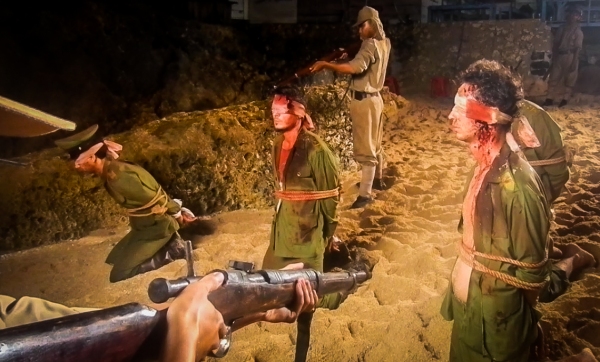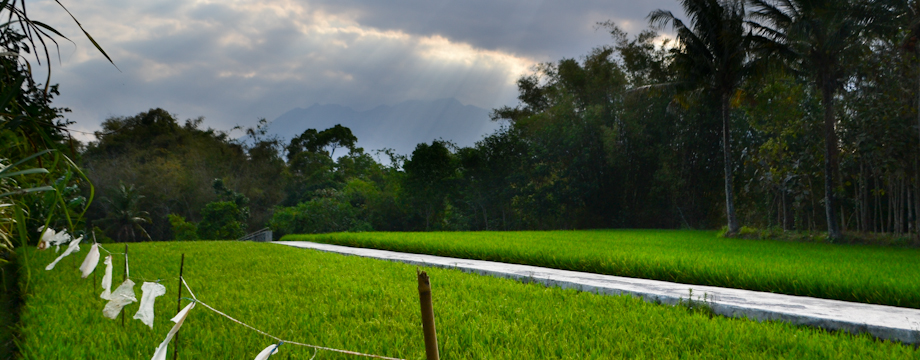Áramszünet, persze pár perccel azután, hogy elkezdtem belemerülni a könyvembe… Legalább elhallgatott a földszintről a Las Ketchup denevérember edition, amivel az alattam lakók a szerda estét ünnepelték épp (na-na-na-na, na-na-na-na, na-na-na-na, na-na-na-na, na-na-na-na na-nna naaaa-na! majd refrén nanana na, na, na-na, nanananana nananananna-nannanna-nananana nananananananana! el sem tudjátok képzelni milyen jó móka volt ezt begépelni:)). Hát legyen így, ha fény nincs, én bedugom a fülhallgatót és írni kezdek, amíg bírja a laptop akksival!

A Merapi vulkán, amiről nemsokára szó lesz. Megéri megmászni!
Hoppá, fülhallgató! Volt pár napja egy olyan when life gives you lemons pillanatom, amire nagyon büszke vagyok, el is mesélem: egy hónapja vettem négyszázötven forintért egy fülhallgatót, ami bő száz óra aktív használat után leásta magát az ennél nem lehet rosszabb hangminőség-szintről a de hangminőség-szintre. Ezen a ponton kigyulladt a fejemben egy lámpa és azóta csak és kizárólag egy nagyon régi blues dalok válogatást hallgatok vele, ami így szól igazán jól! Én ezt úgy könyveltem el, hogy nyertem. Chicken shack boogie!
Vissza!
Zeneileg aláfestett termékeny félholt vagyok tehát, ülök itt a sötétben és a tegnapi után egy újabb bejegyzésbe kezdek. Hiába, az ígéret szép szó, ha megtartják, ha nem!
Jöjjenek a japán katonák, azt hiszem az a legnagyobb tartozásom. Belegondoltam ugyanis és én nem érezném teljesen jófej dolognak, hogyha valamelyik ismerősöm közzétenne mindenféle komment nélkül egy olyan képet, amin éppen csurom véresen, bekötött szemmel és megkötözve térdel egy ázsiai kivégzőosztag előtt. Azt gondolnám, ez egyáltalán nem vicces – ezért szeretnék is ezúton elnézést kérni bárkitől, akinek nem tetszett.

Ez az a kép. Fegyverek, erőszak, vér, homok, minden ami kell
Titokban én már hónapok óta irigykedem azokra a Darmasiswásokra, akik mindenféle forgatásokon vettek részt az utóbbi hónapokban. Egyrészt ott volt az instant szárság, a money for nothing and chicks for free, az elsőre teljesen értelmezhetetlen de mindenképpen menő képek a facebookon, a kokainhegyek, az ingyen rizs, vagyis a teljes királyságcsomag, másrészt pedig a sejtelmes mosolyokból és a kikényszerített vallomásokból az is kiderült, hogy egyáltalán nem rossz üzlet a statisztálkodás pusztán anyagi szempontból sem. Nagyon megörültem tehát, mikor Jogjakartában egy este Peti megemlítette hogy pánik van, most szólt a kerítő hogy rögtön másnap reggelre kellene egy tucat fehérember, forgatni. Ráadásul éppen akkor terveztük Gergővel, aki Ausztrália és Magyarország között átutazóban látogatott meg engem, hogy mit csináljunk azzal a kevés idővel, amit még Indonéziában tölt. Holland katonásdit játszani egy indonéz nagy költségvetésű mozifilm forgatásán, ráadásul az egyik legszebb környékbeli tengerparton? Naná!

Távirányítós robbanó vérpatron
Gond mindössze annyi volt, hogy az indulást reggel hatra tervezték, mi pedig az előző éjjel épp egy vulkánt másztuk meg alvás helyett. Valójában aludtunk mi majdnem egy órát az amúgy a világ tíz legaktívabb vulkánja közé sorolt Merapi kráterének keskeny peremén, 3000 méter magasan, egymás hegyén-hátán, de ez – hiába volt az egyik legemlékezetesebb alvásom életemben a régimotoros motoros jó barátom Ádám által (itt) és általam (ott) két felvonásban egyszer már megénekel szintén toptizes Stromboli vulkánon töltött éjszakával holtversenyben – azért pihentetőnek nem volt mondható. Már csak azért sem, mert miután kora délután leértünk a hegyről, ki-ha-mi-nem alapon még azon nyomban ellátogattunk a Borobudurhoz is, hogy végül egy hazáig tartó, motoron elkövetett, nagyon izgalmas és elgondolkodtató, sajnálatosan félbemaradt beszélgetés után egész késő este essünk be Petiékhez a hírre, hogy holnap reggel hatkor indulás forgatni.

Vulkán tetején alvás. Ha Beni a bal oldalára fordul álmában, belezuhan a fortyogó kráterbe
A túlnyomórészt magyarokból álló, kicsit egyiptomi és kicsit belga csapatunk rövid eltévedések után másnap délután meg is érkezett a déli óceánpart valamelyik strandjára, ahol pillanatok alatt iszonyatos fizetett semmittevés vette kezdetét, lévén hogy a teljes filmes stábból egy lélek nem volt még ott rajtuk kivül. Amúgy is hiányzott már az alvás, de pénzért, árnyékban, a hullámtörés hangjára egyenesen gyerekjáték volt visszaaludni.

Japán holland két jó barát, eloldozza áldozatát!
Pár óra múlva, kora délután keltettek a következő jó hírrel: ingyen fodrász! Kiderült ugyanis, hogy ezt a filmet tényleg nem kispályások intézik. Itt autentikus rend van, vagyis a holland katonáknak nem lehet hosszú a hajuk! A fodrász-sminkes srác mindenkinek felnyírta a haját (aki hagyta) oldalt és hátul, azzal az indoklással hogy a jelenetben sapka lesz rajtunk, tehát a fejünk teteje jó lesz ahogy van. Az eredmény persze zseniális volt, én például ugyan viccességben alulmaradtam az egyiptomi srác űrafro frizurájával szemben, de azért komoly kérdések vetődtek fel azzal kapcsolatban, hogy a történelem során mikor is hordták az emberek az enyémhez hasonlóan a hajukat. Volt aki a harmincas évekre tette, de például Patricia máig ragaszkodik a tizennyolcadik századhoz. Szerintem akkor lesz mindenki a legboldogabb, ha maradunk a negyvenes évek holland katonai divatjánál, ugyanis a felvett jelenetben természetesen a statiszták nagy részén végül nem volt sapka…

Alakul a vicces frizura! Külön felhívnám a figyelmet a szakszerű maszkhasználatra
Azért a fodrászterror és maga a jelenet között még történt pár meglepő dolog. Egyrészt gondos indonéz kezek viszonylag egyenletesen összekentek minket olajjal (ahogy azt hadifogolyéknál szokás), illetve mindenki kapott a testére és az időközben előkerült egyenruhákra körülbelül tíz-tíz gramm kakaóport, nagyjából egyenletesen eloszlatva. Bennem egyébként az olcsó kakaópor illata örökre össze is kapcsolódott a nappal, nem tudom hogy valaha fogok-e tudni úgy kivégzésre gondolni hogy ne a kakaópor illata ugorjon be, és fordítva. Lefogadom, hogy ebből fog még kellemetlenségem származni ebben az életben.
Kaptunk bakancsot zoknival, nadrágot, zubbonyt, tányérsapkát a szerencsésebbek fehér asszonyverő atlétát is. Nekem vagy nem jutott, vagy tényleg annyira autentikus hadifogoly-alkatom van, hogy azt semmiképpen nem akarták eltakarni. A térdeinkre kivégzésbiztos térdelőkötések kerültek, miközben a társaság szorgalmasabb része kicsit idegesen gyűrögette a papírfecnijét, amiről Vilhelmösz szelleme nézett vissza vádlón. Hát milyen holland katonák vagyunk mi, hogy még a himnuszunkat sem tudjuk?!

Max a belga nem pihen, térdszalagavató közben is boss naciban tolja a vilhelmöszt
Történt ugyanis, hogy valahol a tehetséges fodrász és a kakaópor között félúton valaki bejelentette, hogy a jelenetben mi bizony énekelni fogunk. Jajveszékelve, hollandul, a himnuszt, fejből. Elő is került nem sokkal később egy pici, törékeny holland lány aki le tudta írni nekünk a szöveget, ráadásul el is énekelte nekünk, sajnos borzasztóan raccsolva. Miután rájöttünk hogy közülünk senki nem tud se hollandul, se énekelni (Gergőnek az éneklés mondjuk ment, ráadásul már majdnem egy órája abbahagyta a hányást és már alig rázta a hideg), hollandul énekelni pedig főleg nem, Peti gyorsan gyalázatos fonetikus magyarításba kezdett, hogy elkezdődhessen az olvasópróba. Van róla videó, az autentikus cetlifordítás miatt most bele is néztem, de nem ajánlanám a barátaimnak… helyette álljon itt egymás alatt az eredeti verzió és Peti változata, amit kézhez kaptunk.
Wilhelmus van Nassouwe
Ben ik van Duitsen bloed
Den vaderland getrouwe
Blijf ik tot in den dood
Een Prince van Oranjen
Ben ik vrij onverveerd
Den Koning van Hispanjen
Heb ik altijd geëerd
illetve
vilhelmösz fan naszaöe
benik fan dáucsöe blút
den fáderland hötraue
blejf ik tot in dendooddúd
en prinsze fan oranje
benik frej onförfirt
den kouning fan hiszpanje
hepik altej höirt!
A siker garantált volt, ugyanis a mi bizonytalanságunk mellé a fehér hős, a japán hadvezér szintén kivégzésre kerülő főellensége, vagyis a holland tisztet alakító német fociedző szintén nem tudott se énekelni, se hollandul, se szöveget megjegyezni. Biztos vagyok benne hogy az úr például remek partjelző, ugyanakkor azt hiszem az egész produkciónak segített volna kicsit ha helyette egy színész játszotta volna a hős mártírt.

A fehér hős. Érik az oscar, hajlik a vessző!
Mi mindenesetre a felelősség vélt vagy valós hiányából fakadóan nagyon jól szórakoztunk, fényképezkedtünk a japánnak beöltözött indonéz hóhérainkkal, fogadtuk az újabb és újabb kakaórétegeket, nekem még a hajam is bezselézték. Mivel nem csak a mi jeleneteinket vették fel, ezért volt bőven időnk hátrakötött kézzel, véresen a homokban heverni, dokumentálni, illetve a körülményekhez képest segíteni egymáson. Én például, akinek ügyetlenül kötötték meg a kezét, meg tudtam vakarni más, tisztességesen lekötözött bajtársam orrát.

A jólnevelt hadifogoly piros sámlin várakozik…

…vagy a homokban fekszik!
Persze közben csúsztunk ki az időből, lement a nap, hármunkat pedig még mindig nem végeztek ki tisztességesen. Ez volt az utolsó aznap felvett beállítás, mindenki nagyon sietett, talán ezért csak kétszer kellett képzet lyukkal az agykoponyánkon arcra esnünk a homokban. Ez a művelet egyébként nem is annyira könnyű, minden ösztönnek ellentmond. Másodjára azért valahogy csak sikerült, jól meg is tapsoltak minket, majd nem sokkal később valaki fel is segítette az arccal a homokban heverő megkötözött holttestemet. Hurrá!

Mindent összevetve izgalmas élmény volt, mindenképpen megérte. Azért hátrakötött kézzel, bekötött szemmel a homokban térdelni puskacsővel a tarkómban egy kicsit megrázó élmény volt és meghalás közben a nyakamat is meghúztam kicsit, de nem hiszem hogy maradandó sérüléseket okozott volna bármelyik. Délelőtt voltam fodrásznál lego-frizuráért, szóval a mai nappal a holland katonaságban eltöltött időm utolsó látható jele is eltűnt…

A gonosz hadvezér háttal kezd mondatot, pedig azt tilos



